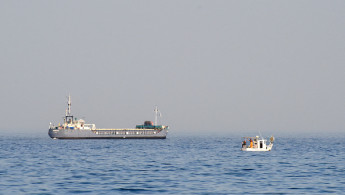Cyprus breached right of two Syrians seeking asylum, European court says
Europe’s top human rights court ruled on Tuesday that Cyprus violated the right of two Syrian nationals to seek asylum in the island nation after keeping them, and more than two dozen other people, aboard a boat at sea for two days before sending them back to Lebanon.
In a damning decision, the European Court of Human Rights said that Cypriot authorities had returned the two 41-year-old cousins from Idlib, Syria, without processing their asylum claims, making sure they would have the asylum claims processed in Lebanon or ensuring they wouldn’t be forcibly returned to Syria where they could face persecution.
"In light of the foregoing, the court finds it sufficiently established that in the present case the Cypriot authorities essentially returned the applicants to Lebanon without processing their asylum claims and without all the steps required under the Refugee Law," the court said in its judgment.
The court also found that Cypriot authorities "caused the applicants considerable distress and feelings of humiliation of such a degree as to amount to degrading treatment," because they hadn’t provided adequate food or water to all the passengers who had to sleep in the boat for two days without access to hygiene facilities.
Cypriot marine police had intercepted the boat after it departed from Lebanon in early September 2020 inside Cypriot territorial waters. An interpreter told the passengers — Syrian and Lebanese people, including unaccompanied minors — that they wouldn’t be allowed to enter Cyprus and that they should return to Lebanon or they would be sent back.
The passengers subsequently boarded another Cypriot vessel that took them back to Lebanon. According to the court’s findings, the applicants told Cypriot authorities that they wanted to apply for asylum after their house was destroyed in the war in Syria and needed to care for their children and families.
Cypriot authorities dispute that the cousins — who had spent four years in a refugee camp in Lebanon — ever expressed a wish to apply for asylum.
The court also said that a Cypriot government argument that the cousins where returned to Lebanon under a bilateral agreement, which allows for the return of anyone entering Cyprus unlawfully “without any formality,” doesn’t absolve Cyprus of its obligations under the Convention of Human Rights, especially in light of Lebanon’s difficulty in coping with the estimated 1.5 million refugees that it hosts.
The court ordered Cyprus to pay each applicant 22,000 euros ($24,150) for damages and another 4,700 euros ($5,160) jointly for costs and expenses.
In an email response to an Associated Press request for comment on the ruling, Cyprus’ Deputy Ministry of Migration and International Protection said that although the events of the case took place four years ago, it’s still investigating the “circumstances under which those events occurred."
"It should be stressed that the naval patrols that commenced in April 2024 are being carried out in conformity with international and European law, while no human lives have been put in danger,” the Deputy Ministry said. "This is supported by the fact that during this period there’s been no search and rescue incident involving irregular migrants at sea.’
Cyprus has seen asylum-seeker arrivals either by sea or through a U.N. buffer zone separating the breakaway Turkish Cypriot north from the internationally recognized Greek Cypriot south drop significantly in recent months, thanks to a get-tough approach by a government sensitive to anti-migrant sentiments among a sizeable segment of the population.
The ruling comes just a couple of months after the U.N. refugee agency Cypriot said that government authorities had rounded up dozens of migrants and pushed them back inside the buffer zone that they crossed to seek asylum.
Last month, Human Rights Watch said in a report that European aid sent to Lebanon in an attempt to regulate migration by sea is funding practices that violate human rights.





 Follow the Middle East's top stories in English at The New Arab on Google News
Follow the Middle East's top stories in English at The New Arab on Google News


